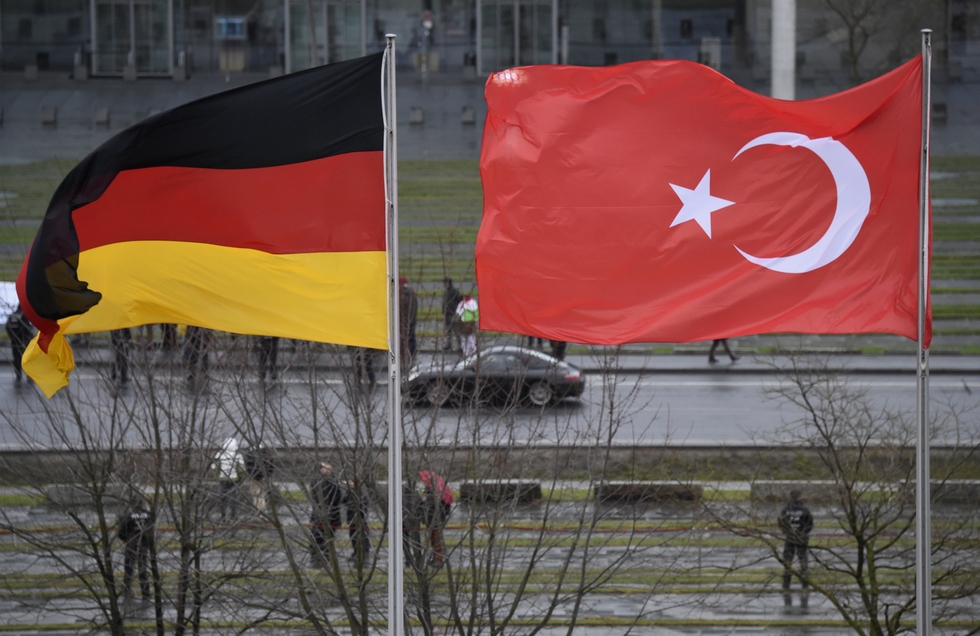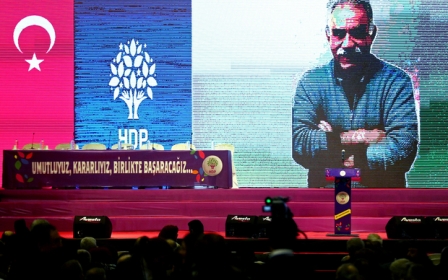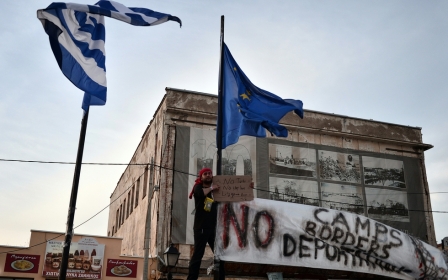Did Germany use the Armenian genocide vote to blackmail Turkey?

One question persists over the German parliament’s decision to approve a symbolic resolution labelling the controversial events in Turkey of 1915 as genocide: Why now?
Turkish President Recep Tayyip Erdogan has repeatedly affirmed that Ankara is ready to declassify more than one million documents covering the events, and encouraged the Armenians to do the same. He has pledged that if an "independent panel of historians" concludes that this was genocide, then Turkey is ready to be held accountable.
It has also been a century since the purported atrocities during World War I were committed. So why hadn't the German Parliament voted in favour of such a resolution during all that time? Or even during the centennial anniversary of the events last year?
That Berlin has chosen now to take this stance, suggests political blackmail aimed at complicating the accession of Turkey to the EU, or perhaps ongoing negotiations over the visa-free travel to the Schengen area.
Why now?
The resolution, which stipulates clearly that what happened was a "genocide" due to deliberate expulsion, deportation and annihilation, was initially proposed by the German governing coalition.
It passed with a sweeping majority from all parties on 2 June, including the party of Chancellor Angela Merkel. However, Merkel herself skipped the session in a move that aimed to distance her government from the parliament's decision.
Legally, such a controversial resolution faces scrutiny over the fact that retrospective laws are universally considered inconsistent with the rule of law. In other words, can the German parliament, from a legal point of view, retrospectively determine that what happened in 1915 was a genocide? The legal concept of a genocide didn’t exist until the genocide notion came into force in 1951.
It is stimulating to recall that the European Court of Human Rights (ECHR) said the Holocaust is an established historical reality, documented in world courts. However, the events of 1915 do not fall into this category.
It also stated that the conception of "genocide" is an accurately demarcated legal perception. For a crime to be labelled as a genocide, atrocities must have been planned in advance and committed for the purpose of deliberate expulsion and extermination of a particular ethnic group. Thus, a genocide is a very meticulous legal notion that is, moreover, problematic to validate or substantiate.
Despite Erdogan’s warning a day before the resolution was passed, Merkel didn’t exert any tangible effort to prevent such a reckless resolution. Erdogan was quoted as saying: "In case such a resolution was approved, Merkel needs to remember that we are both NATO countries and that will badly harm our bilateral, diplomatic, economic and military relations."
It is believed that the repercussions of the resolution are not to go as far as severing diplomatic ties. Indeed, 20 other countries including Austria, France and the Vatican have labelled the same atrocities a "genocide" and while this definitely has led to diplomatic discord with Turkey, it hasn't resulted in permanent harm.
Western atrocities
Critics of Ankara’s stance claim that Turkey has exaggerated sensitivity towards such criticism, pointing out that the German government doesn’t feel offended when historians set their judgment on the Nazis, accusing them of perpetrating genocide against the Jews. Nobody claims the current German government is responsible for the transgressions of its predecessors.
However, the Nazi's crimes are indisputable. Many historians, while admitting the deaths in the events of 1915, say that what happened does not equate to a genocide, principally because the evidence doesn’t exist.
It is simply frivolous for any sovereign independent country to accept the logic of accusing its predecessors of perpetrating massacres that amount to a genocide, especially when the fault-finder has unequivocal dark areas in its past.
Would the United States be happy to have another country label what happened to Native Americans as genocide, or perhaps class the transatlantic slave trade in the 15th-19th centuries as a crime against humanity?
Commenting on the resolution, Erdogan mockingly said: "The last country to make such accusations should be Germany."
He added that Germany should reconsider its empire’s massacres of indigenous Namibians a century ago, when an estimated 10,000 from the Nama tribe, and 24,000-100,000 of the Herero were exterminated. One has to wonder, why hasn’t Berlin officially termed that a genocide, whereas they take full responsibility for the Holocaust?
On 23 April 2015, the Flemish Parliament of Belgium unanimously adopted a resolution to fully recognise the Armenian Genocide, overlooking the reign of terror inaugurated by their King Leopold II between 1885 and 1908. It is believed that under his rule of terror, 8-10 million Congolese people lost their lives; that amounts to more than half of the population.
There are also the white settlers and British forces who crushed the Mau Mau rebellion in Kenya in 1950s. Then, 320,000 Kenyans were driven up to concentration camps and over a million were confined in fenced villages. That would be perceived as a small crime when compared to their barbarous brutal massacres against Indians. Mike Davis reports in his book Late Victorian Holocaust that the policies of the British state killed between 12 and 29 million Indians.
The list goes on with the British ruthless atrocities: the Tasmanian genocide, the use of collective punishment in Malaya, the bombing of villages in Oman, the dirty war in North Yemen, the evacuation of Diego Garcia. The UK doesn’t acknowledge its responsibility for any of them, and most importantly, it doesn’t admit the UK's responsibility for the Palestinian Nakba that created more than 750,000 Palestinian refugees facing imminent evictions and expulsions.
In 2006, the French Parliament passed a bill that not only recognised the events of 1915 as a genocide, but decreed a punishment for anyone who denies the Armenian genocide of up to five years' imprisonment and a fine, and it was passed. This despite the horrible massacres perpetrated by the French army during their colonisation of Algeria. As estimated in 1964, the nearly eight years of revolution against French occupation caused 1.5 million deaths from war-related causes.
All those recent massacres that highlight Europeans’ double standards and hypocrisy were not admitted, and neither forgiveness nor redemption were sought from victims. If the object is truly ethical and Europe is morally motivated to ask Turkey to accept its history, then primarily, these countries need to reconcile with their own dark ages.
Any state is naturally upset when another country dictates its history. The tribunals that were held in 1915 convicted a great number of soldiers of dereliction of duty by committing various offences and massacres against civilians. Turkey acknowledges its history adding that many ethnic Turks also suffered in the conflict, but it doesn’t put this into the category of a genocide.
It seems absolutely peculiar for Germany to give itself the privilege to be the moral arbiter of the world; it can only be perceived as a form of expiation for its own historical sins and to swerve attention from the dark chapters of its own history at the time of the Nazis.
Kurdish vs 'Islamist'?
Bizarrely, there are commentators on social media comparing Turkey's counter-terrorism operations against separatist Kurdish militants to the Armenian atrocities.
Other commentators venture further into madness by blaming "Islamists" for the deaths of Armenians. The irony is that even pro-Armenian sources acknowledge that, firstly, the state-organised attacks were carried out mainly through the mobilisation and deployment of Kurdish fighters, and secondly, the orchestrators of the atrocities were pro-Western secular Turks who hated the Ottomans. The history of the tragedy is much more complicated than distorted over-simplifications.
Trading in tragedy
This doesn’t mean that what happened was not a terrible tragedy; anyone with a beating heart would feel bad over what happened to the Ottoman Armenians. But one has to ask the question: is Germany – like other states before it – capitalising on the tragedy of Armenians for political reasons?
The hypocrisy of Germany, among others, is apparent in the fact that both try so hard to unearth the records of the last century, while displaying nothing but apathy and a deafening silence towards 21st-century genocides that are ongoing against the civilians in Syria and Iraq and before in Palestine.
- Ahmed al-Burai is a lecturer at Istanbul Aydin University. He worked with BBC World Service Trust and the LA Times in Gaza. He is currently based in Istanbul and mainly interested in Middle East issues. You can follow him on Twitter @ahmedalburai1
The views expressed in this article belong to the author and do not necessarily reflect the editorial policy of Middle East Eye.
Photo: The German (L) and the Turkish national flags flutter in front of the Chancellery in Berlin, on 12 January, 2015 in Berlin (AFP).
This article is available in French on Middle East Eye French edition.
New MEE newsletter: Jerusalem Dispatch
Sign up to get the latest insights and analysis on Israel-Palestine, alongside Turkey Unpacked and other MEE newsletters
Middle East Eye delivers independent and unrivalled coverage and analysis of the Middle East, North Africa and beyond. To learn more about republishing this content and the associated fees, please fill out this form. More about MEE can be found here.





